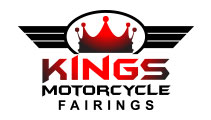How To Hand Wax Your Motorcycle
How To Hand Wax Your Motorcycle by KingsMotorcycleFairings.com
Before we dive into “how to wax your motorcycle”, our team at KingsMotorcycleFairings.com wanted to share with our readers what makes waxing your bike so important. Well, waxing your motorcycle is one of the most cost efficient ways to keep your sport bike in tip-top shape! It's easy to assume waxing is done just for aesthetics, however a layer of protective wax can significantly help keep your bike both dirt and dust free while enhancing the natural shine of your fairings! In addition to waxing being very beneficial for your bike, it can also be a fast and easy process once you get the hang of it.
How to prepare
Prior to waxing, you’ll want to ensure your bike is freshly washed and rid of any dirt, dust and debris. If you’re new to hand washing your motorcycle, or simply looking for some pro tips, please visit our previous blog article on “How To Wash Your Motorcycle”. Properly washing your motorcycle prior to applying the wax is crucial, because it will help reduce the chances of scratching your bike when applying the wax. Pro Tip: You’ll want to move your bike into a shady area, it’s never a good idea to wax in direct sunlight. The sun can cause the wax to essentially bake onto your bike making the wax very difficult to spread effectively.
What you'll need
- Microfiber cloths
- Motorcycle wax
- Microfiber applicator pad (this helps evenly distribute the wax for a better finish and typically comes prepackaged with the motorcycle wax you purchase)
It’s time to wax
Ok, now it is time to wax your freshly washed bike. First, grab one of your clean microfiber cloths and lightly wipe away any dust or dirt that may have settled. Next, grab your microfiber applicator pad and your motorcycle wax. Apply a quarter size amount of wax directly to the applicator pad. Trust us, a little wax can go a long way and adding too much wax at once can make the process less manageable and messy (plus, you can always add more wax during the process if you feel it is necessary). Now when applying the wax, focus on one area at a time and lightly apply the wax with the pad in a circular motion. At first glance, you’ll likely notice a dull and cloudy residue being left behind, this is completely normal and all apart of the process as the wax thins out and dries. Once finished applying the wax across all of your painted motorcycle fairing pieces, simply let the wax sit and finish drying fully in a shaded area before starting the next & final step.
Final step
You're almost done, congrats! Once the wax on your motorcycle has dried, take a clean microfiber cloth and start to thoroughly wipe the excess residual wax away. During this process you’ll start to notice the dull residue slowly disappearing, with some spots possibly needing a little extra elbow grease depending on the wax and how much was applied. After you have finished wiping off the wax, take a step back and examine your bike for any wax marks, chunks or streaks you may have missed. If you discover a few dry areas on your bike that could have used a little extra wax, you can always go back and repeat the waxing process in that specific fairing section. That's it. Simple enough, right? You’re now ready to take your bike out on the road and show off the freshness!

The team here at KingsMotorcycleFairings.com hope that you found this article helpful. If you have extra time, we’d love for you to visit our online store for the largest selection of quality Motorcycle Fairing Kits, Helmets, Gear & Accessories!

